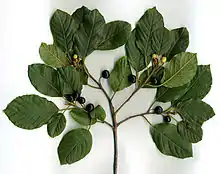Frangula
Frangula is a genus of about 35 species of flowering shrubs or small trees, commonly known as alder buckthorn in the buckthorn family Rhamnaceae.[1] The common name buckthorn is also used to describe species of the genus Rhamnus in the same family and also sea-buckthorn, Hippophae rhamnoides in the Elaeagnaceae.
| Frangula | |
|---|---|
 | |
| Frangula alnus | |
| Scientific classification | |
| Kingdom: | Plantae |
| Clade: | Tracheophytes |
| Clade: | Angiosperms |
| Clade: | Eudicots |
| Clade: | Rosids |
| Order: | Rosales |
| Family: | Rhamnaceae |
| Tribe: | Rhamneae |
| Genus: | Frangula Mill. |
| Species | |
|
See text | |
Description
Frangula is a genus of deciduous shrubs with alternate, simple leaves with stipules, buds without bud scales, branches without spines and flowers with five petals and undivided styles. The fruits are 2 to 4-seeded berries.[2]:279
Selected species include:
- Frangula alnus – alder buckthorn, glossy buckthorn, breaking buckthorn, black dogwood
- Frangula azorica
- Frangula betulifolia – birchleaf buckthorn
- Frangula californica – California buckthorn, coffeeberry
- Frangula caroliniana – Carolina buckthorn, Indian cherry (orth. var. R. carolinianus)
- Frangula purshiana – cascara buckthorn (orth. var. R. purshianus)
- Frangula rubra – red buckthorn
The European species, alder buckthorn (Frangula alnus) was of major military importance in the 15th to 19th centuries, as its wood provided the best quality charcoal for gunpowder manufacture.[3]
References
- "The Plant List: Frangula". Royal Botanic Gardens, Kew. 2013.
- Stace, C. A. (2010). New Flora of the British Isles (Third ed.). Cambridge, U.K.: Cambridge University Press. p. 88. ISBN 9780521707725.
- Francis Montagu Smith (1871). A handbook of the manufacture and proof of gunpowder, as carried on at the Royal Gunpowder Factory, Waltham Abbey. H.M. Stationery Office. pp. 26–. Retrieved 2 April 2013.